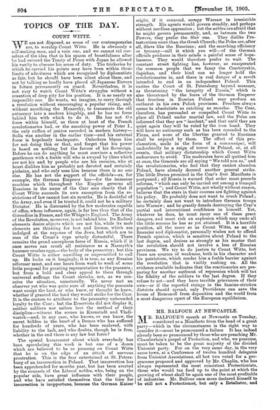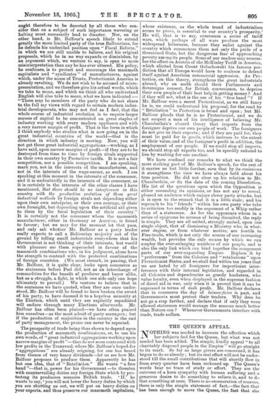ought therefore to be deserted by all those who con-
sider that on a subject of such importance wavering or halting• must necessarily lead to disaster. Nor, on the other hand, is Mr. Balfour's speech likely to extend greatly the more limited Party of the true Balfourians, for he defends his undecided position upon "Fiscal Reform," in which we are still unable to believe, and his original proposals, which he in no way expands or diminishes, by an argument which, we venture to say, is open to more misinterpretation than any he has ever uttered. His policy, he confesses, is to protect and encourage the mammoth capitalists and " syndicates " of manufacturers, against which, under the name of Trusts, Protectionist America is already revolting. We do not wish to be accused of misre- presentation, and we therefore give his actual words, which we take to mean, and which we think all who understand English will also take to mean, what we have indicated :— "There may be members of the party who do not share to the full my views with regard to certain modern indus- trial developments, who may not feel as I feel, that the whole course of industrial evolution is to require larger masses of capital to be concentrated on great staples of industry working with every modern appliance and with a very narrow margin of profit. That is the form in which I think anybody who studies what is now going on in the great industrial countries of the world—that is the direction in which industry is moving. Now, you will not get these great industrial aggregations—working, as I have said, upon narrow margins of profit—if they are to be destroyed from time to time by foreign rivals supported in their own country by Protective tariffs. It is not a fair competition, nor a possible competition. I am speaking, mark you, not in the interests of the manufacturer, and not in the interests of the wage-earner, as such. I am speaking at this moment in the interests of the consumer, and it is undoubtedly in the interests of the consumer, as it is certainly in the interests of the other classes I have mentioned, that there should be no interference in this country with the productive evolution of those great industrial methods by foreign rivals not depending either upon their own enterprise, or their own courage, or their own foresight, but depending upon the artificial aid given to them by the fiscal legislation of their country." It is certainly not the consumer whom the mammoth manufacturer, either in Germany or America, is found to favour; but we may for the moment let that pass, and only ask whether Mr. Balfour as a party leader really expects to call a Balfourian majority out of the ground by telling small industrials everywhere that his Government is not thinking of their interests, but would with pleasure see them superseded in favour of the mammoth combinations who, in his judgment, alone have the strength to contend with the protected combinations of foreign countries. (We must remark, in passing, that Mr. Balfour, it is quite clear, looks upon commerce as the statesmen before Peel did, not as an interchange of commodities for the benefit of producer and buyer alike, but as a struggle, a fight, in which one side only can hope ultimately to prevail.) We venture to believe that in the sentences we have quoted, when they are once under- stood, Mr. Balfour will be found to have broken the sword of his party, to have doomed it to a hopeless minority at the Election, which until they are explicitly repudiated will endure through many Elections afterwards. Mr. Balfour has often been praised—we have often praised him ourselves—as the most adroit of party managers ; but if the production of majorities in the country is the end of party management, the praise can never be repeated.
The prosperity of trade being thus shown to depend upon the production of mammoth combinations, or, to use his own words, of "great indUstrial aggregations working upon narrow margins of profit "—they do not seem contented with low profits in the Transvaal, where Mr. Balfour's hoped-for " aggregations " are already reigning, for one has heard from thence of very heavy dividends—let us see how Mr. Balfour proposes to produce them. Apparently he has but one idea, that of "Retaliation." He wants "a free hand "—that is, power for his Government —to threaten with countervailing duties any foreign State which by pro- tecting its producers menaces British trade. If,' he wants to say, you will not lower the heavy duties by Which you are shutting us out, we will put on heavy duties on your exports, and thus preserve our mammoth capitalists, whose existence, as the whole trend of industrialism seems to prove, is essential to our country's prosperity.' He will, that is to say, commence a series of tariff wars, which perhaps of all wars produce the most widespread bitterness, because they enlist against the country which commences them not only the pride of a threatened State, but the dangerous fear of approaching poverty among its people. Some of our readers may remem- ber the effect on Austria of the McKinley Tariff in America, which elicited from Count Gtoluchowski his famous pre- diction that all Europe would have to coalesce to defend itself against American commercial aggression. As Pro- tection, on this theory, strengthens the great industrials abroad, why on earth should their Parliaments and Sovereigns consent, for British convenience, to deprive their own people of their best help in getting money ? And if they will not, what is the use of his "free hand " ? If Mr. Balfour were a secret Protectionist, as we still fancy he is, we could understand his proposal, for the road by " Retaliation " to Protection is broad and open ; but Mr. Balfour pleads that he is no Protectionist, and we do not suspect a man of his intelligence of believing Mr. Chamberlain's absurd theory that imports from the foreigner deprive our own people of work. The foreigners do not give us their exports ; and if they are paid for, they must be paid for in goods, which increase to the extent of their value, and of the foreigner's profit in addition, the employment of our people. If we could atop all imports, we should stop all exports too, and be speedily reduced to live by washing for one another.
We have confined our remarks to what we think the most striking part of Mr. Balfour's speech, for the rest of it carries us but little further, save that by its omissions it strengthens the view we have always held about his true position. He did not clear up his relation to Mr. Chamberlain, or fix the date of the coming Dissolution. Ms list of the questions upon which the Opposition is either concealing its opinions, or has not any to reveal, pleased an audience which enjoys clever party attacks, but it is open to the remark that it is a little stale ; and his reproach to his " friends " within his own party who take to criticism too readily is the argument of a Whip rather than of a statesman. As for the opponents whom in a series of epigrams he accuses of being disunited, the reply is simple. They are all united, strongly united, upon one single object, that of dismissing a Ministry who, in what- ever degree, or from whatever motive, are hostile to Free-trade, which is not only the source of our increasing wealth, but provides the only means by which we can employ the ever-enlarging numbers of our people, and is also the only link which can bind together the component parts of our ever-expanding Empire. Replace it by " preferences" from the Colonies and " retaliations " upon Protectionist States, and we shall find within ten years that we are hated by all foreigners for impertinent inter- ferences with their internal legislation, and regarded in all Colonies and dependencies as greedy hucksters, who value loyalty, even when displayed in the supreme fashion of direct aid in war, only when it is proved that it can be expressed in terms of cash profit. Mr. Balfour declares that in commerce the day of laissez-faire is past, and Governments must protect their traders. Why does he not go a step farther, and declare that if only they were allowed statesmen would manage the seasons much better than Nature can ? Whenever Governments interfere with trade, trade suffers.



































































 Previous page
Previous page